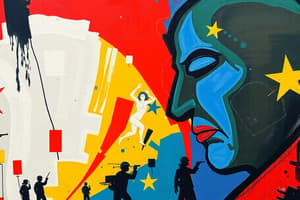Podcast
Questions and Answers
Match the following events with their respective dates:
Match the following events with their respective dates:
Yalta conference = 1945 Bretton Woods conference = 1944 Nuremberg war crimes trial = 1945-1946 Korean War = 1950-1953
Match the following doctrines/policies with their proponents:
Match the following doctrines/policies with their proponents:
Containment doctrine = George F. Kennan Truman Doctrine = Harry S. Truman Marshall Plan = George C. Marshall Fair Deal = Harry S. Truman
Match the following committees/groups with their activities:
Match the following committees/groups with their activities:
House Un-American Activities Committee = Investigating alleged disloyalty and subversive activities National Security Council Memorandum Number 68 = Outlining U.S. strategy during the Cold War Army-McCarthy Hearings = Investigating alleged communist infiltration in the Army GI Bill = Providing benefits to World War II veterans
Match the following figures with their roles in history:
Match the following figures with their roles in history:
Match the following post-WWII economic/social phenomena with their descriptions:
Match the following post-WWII economic/social phenomena with their descriptions:
Flashcards are hidden until you start studying
Study Notes
Post-WWII Conferences
- Yalta Conference (1945): Allied leaders (Roosevelt, Churchill, Stalin) met to discuss post-war reorganization and the formation of the United Nations
- Bretton Woods Conference (1944): established the International Monetary Fund (IMF) and the World Bank to promote international economic stability
War Crimes and Trials
- Nuremberg War Crimes Trial (1945-1946): prosecuted top Nazi officials for war crimes and crimes against humanity
Cold War Emerges
- Berlin Airlift (1948-1949): the US and allies supplied West Berlin by air after the Soviet Union blocked land access
- Containment Doctrine: a US foreign policy strategy to prevent the spread of communism
- Truman Doctrine (1947): a policy of providing economic and military aid to countries threatened by communism
- Marshall Plan (1948): a US program to rebuild war-torn Europe and prevent communist expansion
International Organizations and Alliances
- United Nations (1945): an international organization dedicated to promoting peace, security, and cooperation
- North Atlantic Treaty Organization (NATO) (1949): a military alliance of Western countries to counter Soviet power
National Security and Politics
- National Security Council Memorandum Number 68 (1950): a secret document outlining the communist threat and the need for increased defense spending
- House Un-American Activities Committee (HUAC): a congressional committee investigating communism in the US
- McCarthyism (1950s): a period of intense anti-communist suspicion and persecution led by Senator Joseph McCarthy
- Army-McCarthy Hearings (1954): televised hearings that discredited McCarthy's communist witch-hunt
- Executive Order 9981 (1948): President Truman's order to desegregate the US military
US Domestic Policy and Economy
- Taft-Hartley Act (1947): a labor law restricting union power and allowing states to pass right-to-work laws
- Operation Dixie (1946): a labor movement to organize Southern workers
- Employment Act of 1946: a federal law establishing full employment as a national goal
- GI Bill (1944): a law providing benefits to US veterans, including education and housing assistance
- Fair Deal: President Truman's domestic reform program, including proposals for civil rights and national health insurance
- Sunbelt: a region of rapid growth and development in the southern and western US
- Levittown: a model suburban town built in the 1940s and 1950s
- Redlining: a discriminatory practice of denying or limiting financial services to certain neighborhoods, often based on race
- Baby Boom: a significant increase in US birth rates from the 1940s to the 1960s
Key Figures
- Joseph Stalin: Soviet leader who played a crucial role in shaping the Cold War
- Jiang Jieshi (Chiang Kai-shek): Chinese leader who opposed communism and received US support
- Alger Hiss: a US State Department official accused of being a Soviet spy
- George F. Kennan: a US diplomat and historian who advocated for containment of communism
- George C. Marshall: a US general and statesman who developed the Marshall Plan
- Joseph McCarthy: a US senator who led the anti-communist witch-hunt
- Reinhold Niebuhr: a Christian theologian and intellectual who influenced US foreign policy
- Benjamin Spock: a pediatrician who wrote a bestselling childcare book and became a cultural icon
Studying That Suits You
Use AI to generate personalized quizzes and flashcards to suit your learning preferences.




